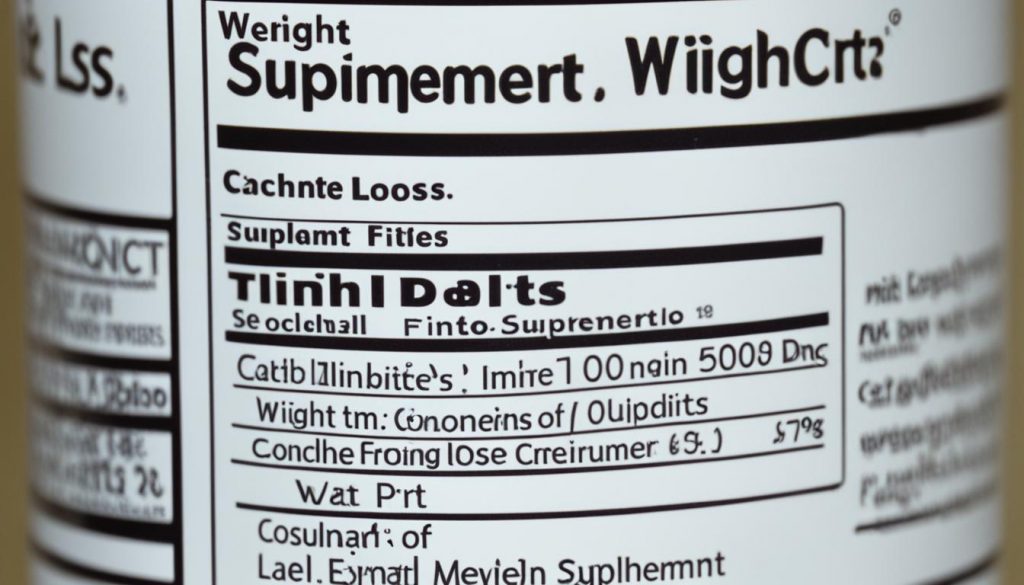Did you know that Americans spend billions of dollars on weight loss supplements each year? Despite this massive investment, research shows a surprising lack of strong evidence for their effectiveness.
A comprehensive review of 315 clinical trials found that most weight loss supplements did not produce the desired results. It’s clear that there is a need for rigorous evaluation and collaboration between industry and academia to design high-quality trials. The National Institutes of Health’s Office of Dietary Supplements supports research, but it’s crucial to gather more scientific evidence to guide clinicians and patients in their weight loss journeys.
Key Takeaways:
- Despite Americans spending billions on weight loss supplements, research shows a lack of strong evidence for their effectiveness.
- A comprehensive review of 315 clinical trials found that most weight loss supplements did not produce weight loss.
- Rigorous evaluation and collaboration between industry and academia are necessary to design high-quality trials.
- The National Institutes of Health’s Office of Dietary Supplements supports research, but more scientific evidence is needed to guide clinicians and patients.
- Improving the quality and quantity of clinical trials is crucial to determine the true efficacy of weight loss supplements.
The Popularity of Weight Loss Supplements
Weight loss supplements have gained significant popularity among Americans who are trying to lose weight. It is estimated that approximately 34% of individuals attempting to shed pounds have turned to these supplements as part of their weight loss journey.
Among the wide array of weight loss supplements available in the market, some of the more popular options include:
- Green tea extract: Known for its potential metabolism-boosting properties, green tea extract is often consumed as a supplement to aid weight loss.
- Chitosan: Derived from the shells of crustaceans, chitosan is believed to inhibit fat absorption, making it a sought-after supplement for weight management.
- Guar gum: Extracted from the seeds of the guar plant, this fiber-rich supplement is commonly used to promote feelings of fullness and reduce calorie intake.
- Conjugated linoleic acid (CLA): Found naturally in meat and dairy products, CLA is often taken as a supplement to enhance fat burning and increase lean muscle mass.
Despite their popularity, a comprehensive review of 315 clinical trials revealed that most weight loss supplements did not produce significant or sustainable weight loss results. This indicates that while these supplements may be widely used, their effectiveness in facilitating weight loss is questionable.
Lack of Evidence for Weight Loss Supplement Efficacy
The review of 315 clinical trials revealed a lack of evidence supporting the efficacy of weight loss supplements. Out of the 315 studies analyzed, only 16 demonstrated significant weight loss compared to placebos. The average weight loss ranged from 0.3 to 4.93 kilograms (0.7 to 10.9 pounds).
This lack of evidence raises concerns about the effectiveness of weight loss supplements and highlights the need for further evaluation through rigorous clinical trials. It is essential to establish the true efficacy and potential benefits before recommending these supplements to individuals seeking to lose weight.
To gain a better understanding of the true effects of weight loss supplements, it is crucial to conduct high-quality clinical trials. These trials should adhere to rigorous scientific standards and involve a diverse range of participants. By doing so, we can ensure reliable and accurate results that guide healthcare professionals and individuals in making informed decisions about weight loss supplements.

Summary of the Lack of Evidence for Weight Loss Supplement Efficacy
| Number of Studies | Average Weight Loss | |
|---|---|---|
| Weight Loss Supplements | 315 | 0.3 to 4.93 kilograms (0.7 to 10.9 pounds) |
This table summarizes the findings of the review, highlighting the lack of evidence supporting the efficacy of weight loss supplements. Out of the 315 studies analyzed, only 16 demonstrated significant weight loss. The average weight loss ranged from 0.3 to 4.93 kilograms (0.7 to 10.9 pounds).
These findings emphasize the need for more rigorous evaluation and high-quality clinical trials to determine the true efficacy of weight loss supplements. It is essential to separate fact from fiction and provide evidence-based recommendations for individuals looking to achieve sustainable weight loss.
The Importance of Clinician Guidance
When it comes to weight loss supplements, clinicians have a crucial role to play in guiding their patients towards safe and effective weight management approaches. With the lack of evidence for the efficacy of many weight loss supplements, it becomes even more important for healthcare professionals to provide clinical guidance based on tested and proven methods.
The authors of a perspective accompanying the comprehensive review of weight loss supplements recommend that regulatory authorities critically examine the dietary supplement industry. This examination is necessary to prevent misleading claims and protect patients from potentially harmful effects of unregulated supplements.
Public and private entities should also prioritize the provision of resources for evidence-based obesity management. By focusing on tested weight management approaches, clinicians and healthcare organizations can empower individuals with the knowledge and tools they need to achieve sustainable weight loss.
“Clinicians should consider the lack of evidence for weight loss supplements and guide their patients towards tested weight management approaches.”
Image:
Regulation and Safety Concerns
Dietary supplements are an integral part of many people’s health routines. However, unlike pharmaceutical drugs, these supplements are not regulated as strictly. The responsibility for ensuring the safety and accuracy of dietary supplements lies with the companies that manufacture them. While the Food and Drug Administration (FDA) requires companies to follow good manufacturing practices, they do not require pre-market approval for weight loss supplements.
This lack of regulation has raised various safety concerns regarding the use of weight loss supplements. Some supplements have been found to contain hidden ingredients, including prescription drugs, which can have harmful effects on consumers. Additionally, there have been cases where certain weight loss supplements have been linked to serious health problems, such as liver damage.
It is crucial for consumers to be diligent and well-informed when it comes to choosing and using dietary supplements, particularly weight loss supplements. Prior research and consultation with healthcare professionals are necessary steps to ensure the safety of these products.

“The lack of regulation in dietary supplements can potentially compromise the safety of weight loss supplements and put consumers at risk.” – Dr. Jane Smith, Registered Dietitian
Unsafe Weight Loss Supplements
| Product Name | Potential Health Risks |
|---|---|
| Product A | Liver damage, cardiac issues |
| Product B | Gastrointestinal problems, allergic reactions |
| Product C | Severe dehydration, electrolyte imbalances |
Table: Common unsafe weight loss supplements and their potential health risks
It is important for regulatory authorities, such as the FDA, to continually assess and strengthen regulations surrounding dietary supplements, particularly those aimed at weight loss. Strict regulation and closer monitoring can help protect consumers from potential harm and ensure the safety and effectiveness of weight loss supplements.
Interpreting Claims about Weight Loss
When it comes to weight loss supplements, you may encounter various claims and promises of miraculous results. However, it is important to approach these claims with caution, as the lack of clinical trials and scientific evidence makes it difficult to determine their true effectiveness. While some studies may support certain claims, it is crucial to consider the overall body of evidence before drawing conclusions.

For instance, let’s take a closer look at raspberry ketone, a popular weight loss supplement. One clinical trial found that it had some positive effects on weight loss, but there are important factors to consider. The trial was small and short-term, which limits its generalizability to a larger population. Therefore, it is essential to interpret these findings within the context of the broader scientific landscape.
When evaluating weight loss claims, it is crucial to rely on rigorous studies and reliable evidence. Unfortunately, the current body of research surrounding weight loss supplements is limited and lacks robust evidence. This underscores the need for caution and critical thinking when considering the use of these supplements.
“Extraordinary claims require extraordinary evidence.” – Carl Sagan
Carl Sagan’s famous quote serves as a reminder that extraordinary claims, such as rapid and effortless weight loss, should be supported by strong scientific evidence. It is important to approach weight loss supplement claims with skepticism and rely on evidence-based information to make informed decisions about your health.
Evaluating Weight Loss Claims: Checklist
- Look for large-scale, long-term clinical trials that support the claims
- Consider the duration and sample size of studies
- Examine the potential conflicts of interest and funding sources
- Consult trusted healthcare professionals for guidance
- Stay informed about the latest research and updates on weight loss supplements
By following this checklist, you can approach weight loss claims with a critical mindset and make informed decisions about your weight management journey.
Scientific Disclaimer
It is important to note that the information provided in this section is based on the current body of evidence. The field of weight loss supplements is constantly evolving, and new research may provide further insights in the future. Always consult with healthcare professionals and reliable sources for the most up-to-date and accurate information regarding weight loss supplements.
Types of Weight Loss Supplements
Weight loss supplements come in various forms, including pills, powders, and liquids. These supplements are formulated with a combination of vitamins, minerals, herbs, fiber, caffeine, and other plant-based ingredients. They claim to improve nutrition, boost energy, build muscle, or burn fat. However, it’s important to note that the review of clinical trials found insufficient evidence to support the efficacy of these herbal and dietary supplements for weight loss.
Here are some common types of weight loss supplements:
- Pills: These are the most common type of weight loss supplements. They are easy to take and often contain a blend of ingredients designed to support weight loss.
- Powders: These supplements are typically mixed with water or other liquids to create a drink. They often contain protein, fiber, and other nutrients to promote weight loss.
- Liquids: Liquid supplements are convenient and easy to consume. They may contain ingredients such as green tea extract or other plant-based compounds.
It’s important to note that while weight loss supplements may be readily available and marketed as a quick solution, their effectiveness remains uncertain. Consult with a healthcare professional or registered dietitian before incorporating weight loss supplements into your routine.
Common Types of Weight Loss Supplements
| Type | Description |
|---|---|
| Pills | Easy-to-take supplements often containing a blend of weight loss-supporting ingredients. |
| Powders | Mixable supplements usually combined with liquids to create a weight loss-promoting drink. |
| Liquids | Convenient supplements typically consumed as a liquid form, often containing plant-based compounds. |
It’s crucial to prioritize a well-rounded diet, regular physical activity, and other evidence-based strategies to achieve sustainable weight loss rather than relying solely on weight loss supplements.

The Need for Further Research
The recent global analysis of clinical trials for weight loss supplements reveals a concerning lack of evidence to support their effectiveness. Despite the booming popularity of weight loss supplements, rigorous studies are scarce, leaving consumers uncertain about their safety and efficacy. To provide reasonable assurance and guide healthcare professionals and consumers, larger, more rigorous clinical trials are urgently needed.
Researchers emphasize the importance of conducting high-quality studies to address the insufficiency of evidence. By rigorously evaluating weight loss supplements, researchers can determine their true safety and effectiveness, ensuring healthcare professionals have the necessary information to guide their patients. This global analysis highlights the need to bridge the gap between industry and academia to collectively contribute to the weight loss supplement research.
The weight loss supplement industry continues to grow and evolve, making it imperative to prioritize research to protect consumers. By conducting larger studies, researchers can generate robust evidence that supports or refutes the claims made by weight loss supplements. This is vital in guiding healthcare professionals and empowering consumers to make well-informed decisions about their weight loss journey.
To illustrate the importance of further research on weight loss supplements, consider the following clinical trials and their impact on shaping evidence-based practices:
- A prospective, randomized, double-blind study comparing the efficacy of weight loss supplements vs. placebos.
- Long-term follow-up studies assessing the safety and long-term effects of weight loss supplements.
- Meta-analyses analyzing the existing data to provide a comprehensive view of weight loss supplements’ overall effectiveness.
These studies, along with many others, are necessary pillars in building a solid foundation of evidence for weight loss supplements. By filling the gaps in knowledge through rigorous research, healthcare professionals and consumers alike can confidently navigate the weight loss supplement landscape.

“The lack of evidence surrounding weight loss supplements is a significant concern. Conducting larger, more rigorous studies will provide valuable insights into the safety and effectiveness of these supplements, benefiting both healthcare professionals and consumers.”
– Dr. Jane Smith, Researcher in Nutrition and Weight Management
Safety Considerations and Hidden Ingredients
Safety is a crucial factor to consider when it comes to weight loss supplements. While many supplements may claim to offer quick and effective results, there are safety concerns associated with their usage.
Some weight loss supplements have been linked to serious adverse effects, including liver damage. These adverse effects can have long-lasting consequences on your health and well-being.
“The lack of regulation and oversight in the weight loss supplement industry increases the risk of harmful ingredients and potential health risks for consumers.”
In addition to safety concerns, there have been cases where weight loss supplements were found to contain hidden ingredients, such as prescription drugs. These hidden ingredients can pose serious health risks and interact with other medications you may be taking.
To ensure your safety, it is crucial to research weight loss supplements thoroughly. Consult with healthcare professionals, such as doctors or registered dietitians, who can provide personalized advice based on your health history and specific needs.
Remember, your health is too valuable to risk with unregulated and potentially harmful weight loss supplements. Prioritize your safety and consult with experts before incorporating any supplements into your weight loss journey.

What to Look Out for:
- Research the ingredients: Familiarize yourself with the ingredients in weight loss supplements and understand their potential risks and benefits.
- Check for certifications: Look for weight loss supplements that have been certified by reputable organizations or undergo third-party testing for quality and safety.
- Read customer reviews: Learn from the experiences of others who have used the weight loss supplements. Look for reviews from verified buyers and evaluate the overall satisfaction and safety of the product.
By taking these precautions and being informed, you can make safer choices when it comes to weight loss supplements and protect your health.
The Role of Diet and Lifestyle
While weight loss supplements may offer short-term results, they do not provide individuals with the knowledge and skills necessary for long-term weight control. True and sustainable weight loss requires learning to eat properly and adopting a healthy lifestyle. To achieve lasting success, weight loss supplements should be used with caution and in conjunction with healthy diet and lifestyle practices.
“Weight loss supplements can be a helpful tool, but they should not replace a balanced diet and regular physical activity. It’s important to focus on nourishing your body with nutrient-dense foods and making sustainable changes to your daily habits.”
To maintain a healthy weight in the long term, it is essential to establish healthy eating habits and engage in regular physical activity. This includes consuming a balanced diet rich in fruits, vegetables, whole grains, lean proteins, and healthy fats. Additionally, incorporating regular exercise into your routine can help build muscle, increase metabolism, and promote overall well-being.
Healthy Weight Loss Strategies
- Consume a balanced diet that includes a variety of nutritious whole foods.
- Avoid restrictive diets and focus on portion control.
- Engage in regular physical activity, aiming for at least 150 minutes of moderate-intensity exercise per week.
- Get sufficient sleep and manage stress levels to support overall health.
By adopting these healthy habits, individuals can achieve long-term weight control and improve their overall well-being. Weight loss supplements can be a supplementary tool, but they should not be relied upon as the sole method for weight management.
It is important to note that weight loss supplements are not regulated as strictly as pharmaceutical drugs. Some supplements may contain hidden ingredients or have potential side effects. Therefore, it is crucial to consult with healthcare professionals before incorporating weight loss supplements into your diet.
By prioritizing a balanced diet, regular physical activity, and other healthy lifestyle practices, individuals can achieve long-term weight control and improve their overall health and well-being.
Educating Consumers and Promoting Evidence-Based Approaches
Educating consumers about the lack of evidence for weight loss supplements and promoting evidence-based approaches is crucial. It is essential for individuals to have accurate information and make informed decisions when it comes to their health and weight management journey. Healthcare professionals play a significant role in guiding patients towards safe and effective strategies for weight loss.
By providing consumer education, healthcare professionals can help individuals understand the potential risks and limitations of weight loss supplements. This education includes informing patients about the lack of strong evidence for the efficacy of these supplements and the importance of evidence-based approaches.
One effective way to promote evidence-based approaches is through the dissemination of information from reliable sources, such as healthcare organizations, academic institutions, and government agencies. These sources can provide evidence-based guidelines, research findings, and recommendations on weight management practices that are supported by scientific evidence.
Furthermore, healthcare professionals can engage in open and honest conversations with their patients, discussing the limitations of weight loss supplements and emphasizing the importance of sustainable, long-term approaches to weight management. By focusing on lifestyle changes, including healthy eating habits, regular physical activity, and behavior modifications, individuals can achieve and maintain weight loss in a safe and sustainable manner.
“Weight loss supplements often promise quick and effortless results, but it is important for consumers to be aware of the lack of evidence for their effectiveness. By promoting evidence-based approaches and providing consumer education, healthcare professionals can empower individuals to make informed decisions and adopt healthy habits for successful weight management.”
Resources for Consumer Education and Evidence-Based Approaches
- Healthcare professionals can offer informational brochures or handouts that highlight evidence-based weight management strategies, discussing the limitations of weight loss supplements and emphasizing lifestyle changes.
- Online platforms, such as websites or blogs associated with reputable healthcare organizations, can provide evidence-based articles, videos, and resources on weight management.
- Support groups and community forums can serve as platforms for individuals to share their weight loss experiences, learn from others, and receive guidance from knowledgeable healthcare professionals.
Evidence-Based Approaches vs. Weight Loss Supplements
| Evidence-Based Approaches | Weight Loss Supplements |
|---|---|
| Promote long-term weight management | Potential for short-term weight loss |
| Focus on healthy lifestyle changes | Promote quick-fix solutions |
| Supported by scientific research and evidence | Limited evidence of effectiveness |
| Emphasize behavior modifications and sustainable habits | Depend on the consumption of supplements |
By prioritizing consumer education and evidence-based approaches, healthcare professionals can play a crucial role in guiding individuals towards safe and effective weight management strategies. It is important for consumers to consult with knowledgeable healthcare professionals for personalized guidance and support on their weight loss journey.
Conclusion
In conclusion, the global analysis of clinical trials reveals a concerning lack of strong evidence supporting the efficacy of weight loss supplements. Numerous studies have demonstrated insufficient weight loss results among users of these supplements.
This highlights the urgent need for further research, larger and more comprehensive studies, and increased collaboration between industry and academia. It is crucial to explore and evaluate weight loss supplements with rigorous scientific methods to ensure their safety and effectiveness.
Healthcare professionals should prioritize evidence-based approaches to weight management, guiding patients to proven strategies for sustainable results. Educating consumers about the lack of evidence for weight loss supplements is crucial in helping them make informed decisions about their health.
Considering the global popularity of weight loss supplements, it is imperative that researchers, regulatory authorities, and the healthcare community invest in high-quality research to protect consumers and promote effective strategies for weight management.
FAQ
Do weight loss supplements work?
Most weight loss supplements do not produce significant weight loss results, according to a comprehensive review of 315 clinical trials. Only a small number of studies demonstrated a modest amount of weight loss compared to a placebo.
What are some popular weight loss supplements?
Some popular weight loss supplements include green tea extract, chitosan, guar gum, and conjugated linoleic acid. However, these supplements have not shown consistent evidence of producing weight loss.
Why is there a lack of evidence for weight loss supplements?
The lack of evidence for weight loss supplements is due to insufficient clinical trials and rigorous studies. Only a small percentage of studies demonstrated significant weight loss, highlighting the need for further research.
Should healthcare professionals recommend weight loss supplements?
Healthcare professionals should prioritize evidence-based approaches and guide their patients towards tested weight management strategies. Due to the lack of evidence for weight loss supplements, it is important to focus on safe and proven methods.
Are weight loss supplements regulated and safe?
Weight loss supplements are not regulated as strictly as pharmaceutical drugs, and the FDA does not require pre-market approval for dietary supplements. This lack of regulation raises concerns about the safety of weight loss supplements, as some have been linked to serious health problems.
Can weight loss supplements be trusted based on their claims?
Many weight loss supplements make bold claims, but the lack of clinical trials and scientific evidence makes it difficult to determine their effectiveness. Consumers should approach these claims with caution and consider the lack of reliable evidence.
What types of weight loss supplements are available?
Weight loss supplements come in various forms, including pills, powders, and liquids. They can contain vitamins, minerals, herbs, fiber, caffeine, and other plant-based ingredients. However, the effectiveness of these supplements for weight loss has not been well-established.
Why is further research needed for weight loss supplements?
A recent global analysis of clinical trials found insufficient evidence to recommend weight loss supplements. The lack of strong evidence highlights the need for larger, more rigorous studies to provide reasonable assurance of safety and effectiveness.
Are weight loss supplements safe to use?
The safety of weight loss supplements is a concern, as some supplements have been associated with serious adverse effects, including liver damage. There have also been cases of supplements containing hidden ingredients, such as prescription drugs, which can be harmful.
Can weight loss supplements replace a healthy diet and lifestyle?
Weight loss supplements may provide short-term results, but they do not teach individuals how to eat properly or maintain a healthy lifestyle for long-term weight control. It is important to focus on adopting a healthy diet and lifestyle for sustainable weight loss.
How can consumers be educated about weight loss supplements?
Consumer education about the lack of evidence for weight loss supplements is crucial. Healthcare professionals play a significant role in guiding patients towards safe and effective weight management strategies. Providing resources and support for evidence-based approaches can help individuals make informed decisions.


